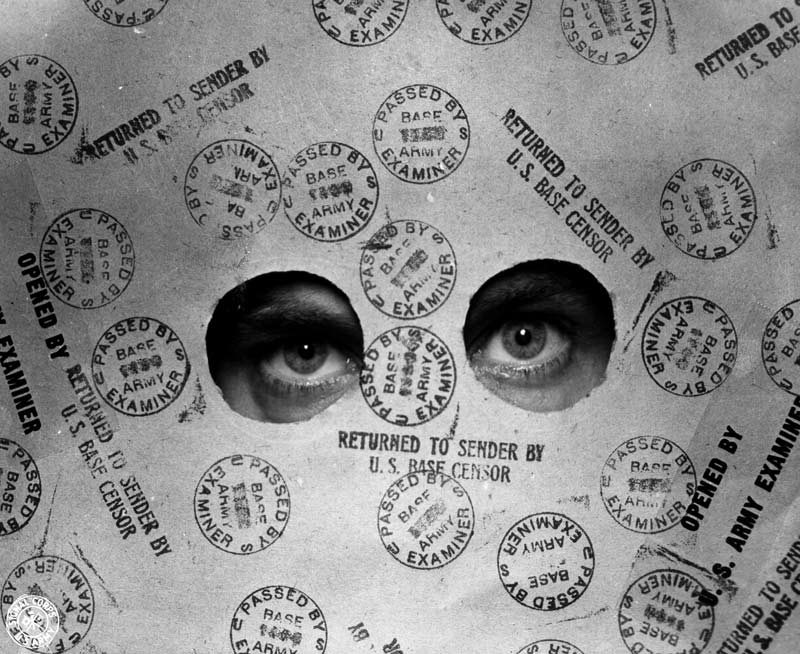 |
| (Defense Media Network) |
During the stressful days of World War II, in the middle of last century, there was still a flow of postal mail across the wide oceans, though at times there were lengthy delays before delivery was finally made to the addressee. Sometimes the method of transportation of the mail was by plane, and sometimes it was by boat, though as we know, there were losses due to enemy action.
For the security of the armed forces in the war zones, censors were appointed to check outgoing mail to ensure that the items of postal mail contained no sensitive information that would be helpful to enemy personnel if by chance they happened to obtain access. Items of half a century old postal mail that are identified in some way as passed by a censor are these days valuable collector’s items. It is true that listener reception reports, QSL cards and QSL letters were subject back then to inspection by an appointed censor, and a sticker or a rubber stamping on the envelope or the card testifies to this intrusion by the censor. Today, we examine a handful of QSLs and reception reports from that era that were examined by a censor.
We begin with Port Moresby in Papua New Guinea, and back at that time, there were Japanese, American and Australian armed forces stationed on the island of New Guinea. Any outward postal mail had to pass over ocean waters, regardless of the intended delivery country. The mediumwave station 9PA with 250 watts on 1250 kHz was operated by both Australian and American personnel, and it broadcast syndicated programming for the benefit of both nationalities. A QSL letter on a blank sheet of paper verifies the reception in Australia of 9PA dated March 23, 1945. Even though the correct call sign would have been 9AA. yet the station identification is shown as 9PA. The envelope carries a sticker stating, Opened by Censor, and a circular rubber stamping identifies the censor as No. 463.
A subsequent QSL letter from the same medium wave station 9PA was typed onto a small ABC letterhead dated June 11 (1945) though it was inserted into an army envelope. The oblong rubber stamping indicates army Censor No. 682. Much of the postal mail across the Pacific back then was examined by a censor, and many of the QSL cards from VOA the Voice of America in California and addressed to Australia and New Zealand carry a rubber stamping from an official censor. Station KWV with 20 kW at AT&T Dixon in California was logged in 1943 by both Jack Fox in Dunedin New Zealand and by Max Mudie (MEW-DEE, rhymes with Beauty) at Victor Harbor in South Australia. In both cases, the Red White and Blue QSL card from KWV was rubber stamped with a large circular stamp stating U. S. Censorship, and in both case it was the same censor, number 10177.
Interestingly, Max Mudie received another 1943 QSL card from AT&T Dixon, this time under another 20 kW call sign KWY, and it was rubber stamped by the very same censor No. 1017. However Jack Fox received a similar 1943 Red White & Blue QSL card from the 50 kW KRCA at Bolinas in California and it was passed by a different censor, No. 10392.
During that same back then era, shortwave station WRUL at Scituate with its studios in Boston received a voluminous flow of listener mail from all over the world. Many of those reception reports and letters were examined by homeland censors before they began their journey across the intervening ocean.
For example, a 1942 envelope addressed to WRUL was examined by a censor in Greenland. The envelope was posted by an American serviceman on duty in Greenland and a sticker sealing the end of the envelope bears the Censor No. 6433. A 1943 envelope from Brazil was examined by Censor No. 6822; a 1943 envelope from Turkey was examined by Censor No. 457; and another 1943 envelope from Martinique in the Caribbean was examined by Censor No. 6915. This envelope was addressed simply to Radio Boston in the United States, but nevertheless it was delivered to the well known Boston shortwave station WRUL.
An equally vague address on an envelope from French Africa was examined by Censor No. 6915. The address again stated quite simply Radio Boston, but the postal authorities nevertheless delivered the missive to shortwave WRUL.
Then there was a postal card that was delivered to a shortwave station in California and it was written in the most difficult handwriting you could ever wish to see. The 1944 postal card was addressed by Private Lawrence E. Hutchinson who was on recovery in Army Hospital 79, which we would suggest was somewhere in the Pacific. The card was addressed to Melody Roundup in Los Angeles. Now that was not a girl’s name, but rather it was the name of a radio program that was presented by the well known music group from that era, the Sons of the Pioneers. Their programming was heard on AFRTS local stations throughout the world, and on shortwave from California.
In order to provide accurate delivery, someone had added a note in pencil with two letters, SW, standing for shortwave. This card was passed by army base Censor No. 1561. The message side of the card stated that the writer was representing all of the patients in Ward A who would like to hear the song, Just Like Old Times. We can only presume that nostalgia was creeping over these wounded army personnel, and we would hope that AFRS Radio Shortwave did indeed honor their music request.
(AWR Wavescan 463)
(AWR Wavescan 463)